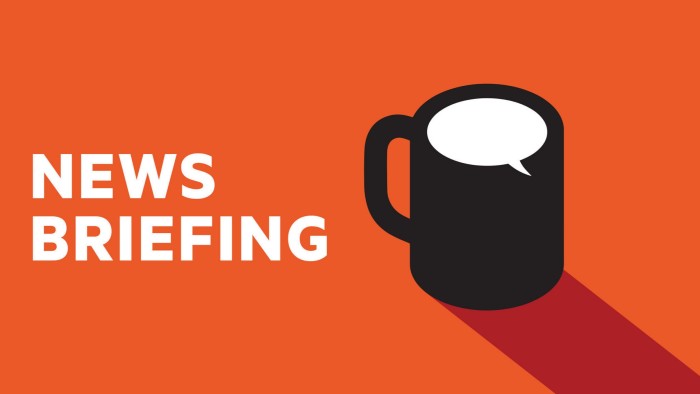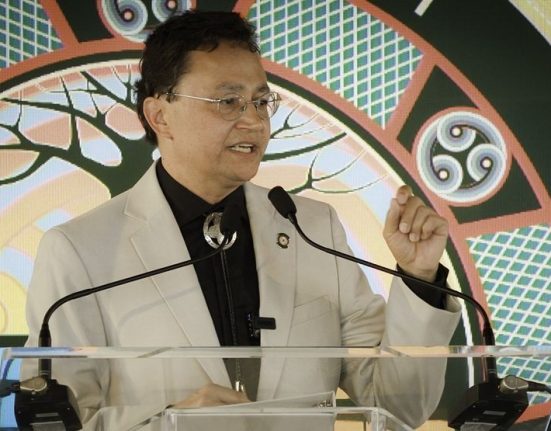This is an audio transcript of the FT News Briefing podcast episode: ‘Foreign investors feel the pinch of US stock slump’
Kasia Broussalian
Good morning from the Financial Times. Today is Monday, March 24th, and this is your FT News Briefing. Canada’s new prime minister has called snap elections. And foreign investors are really feeling the slump in US stocks. Plus, top tennis players are rallying off court in a new legal claim.
Samuel Agini
They really take aim at what they see as the governing body’s grip on the sport.
Kasia Broussalian
I’m Kasia Broussalian, and here’s the news you need to start your day.
[MUSIC PLAYING]
Canada will head for early elections on April 28th. Prime Minister Mark Carney made the announcement on Sunday. The former central banker has taken on a combative tone since becoming Liberal party leader two weeks ago.
Mark Carney voice clip
We needed to act to fix our economy. We needed to act to fight the Americans.
Kasia Broussalian
Carney’s main opponent will be Conservative party leader Pierre Poilievre. He’s drawn a lot of comparisons to Donald Trump. His campaign slogan is even Canada First, but Poilievre has also tried to create some distance between himself and the US president in recent weeks.
Pierre Poilievre voice clip
Is it time to put Canada first for a change, with a new Conservative government that will axe taxes, unleash resources to bring home our jobs, and stand up to Donald Trump from a position of strength?
Kasia Broussalian
Polls showed Conservatives leading by over 20 points just two months ago, but since Trump started threatening the Great White North, the race is neck and neck.
[MUSIC PLAYING]
US markets have been on a bit of a rollercoaster lately. The S&P 500 is down more than 7 per cent since its peak, and the dollar is slipping too. This double whammy is especially painful for foreign investors. Meanwhile, some people are starting to question the dollar’s supremacy. Here to explain is the FT’s Ian Smith. Hey, Ian.
Ian Smith
Hiya.
Kasia Broussalian
So why are foreign investors in such a bad spot here?
Ian Smith
So as you’ve said, US stocks tumbled into correction territory earlier this month as investor worries over the health of the US economy combined with anxiety over high valuations on US stocks versus the rest of the world. But it’s been especially bad for foreign investors who have not hedged away their currency exposure, so they lose in the share price declines. But because of this slide in the dollar that you’ve mentioned, when it’s translated back into their home currency, like the pound or the euro, they get that double effect. The loss that they make is magnified when you translate it back into their own currency. So it’s been particularly painful.
Kasia Broussalian
Well, now just explain that to me from the perspective of, let’s say, a European investor. How exactly are the two linked, you know, the dollar and US equities?
Ian Smith
So in recent months, as we saw US stocks hit record highs, the dollar also strengthened. European investors were getting this gain from the share price rise, but also that positive translation back into the home currency. That was encouraging people to put more. And the overweight that European fund managers had on US stocks was helping to drive US prices higher and helping to strengthen the dollar too. So you had that virtuous cycle happening of stocks going up and the dollar strengthening. Now this has been shifted into reverse. Since the start of the year, most people were expecting US stocks to continue to rise, but instead, the dollar has actually weakened and US stocks have also weakened. So that virtuous cycle has been thrown into reverse.
Kasia Broussalian
All right. So it’s like this self-reinforcing cycle where European investors piling into US stocks have helped strengthen the dollar, and then that’s improved their returns. But now that this virtuous cycle, as you call it, has broken down, what does that mean for the dollar more broadly?
Ian Smith
Some people think there’s something deeper at play here, which is that there is a questioning of the dollar’s role as a haven in times of stress. And that’s because of concerns that they have over US policy under the new administration, and a sense that the dollar might not provide the same security and haven status that it has historically. So the US has said it’s still committed to its strong dollar policy. But there have been lots of ideas flying around and various comments made by people within the administration suggesting that push for a weaker dollar and just more broadly, some concerns people have about, you know, the strength of US institutions and democracy is being reflected in some of this investor feeling towards the dollar. That’s the argument.
Kasia Broussalian
So if the dollar does fall out of favour as the world’s safe haven currency, what kind of ripple effects might that have?
Ian Smith
I should say here, this has been much overstated in the past. You know, the end of dollar supremacy has been many times predicted and hasn’t happened. So there’s lots of reasons to think it won’t happen. When I speak to fund managers and big investors, they say, what you might see is people diversifying a bit away from the dollar, and perhaps an alternative might be the euro. Now, there are limits to that, and the reasons to think the euro lacks this huge market that the US treasuries market presents — its nearly $30tn worth of kind of liquid assets, which are underlying the dollar’s status as the de facto reserve currency. You don’t have the same in the Eurozone, but what you do have is kind of Germany as the core borrower. They’re seeking to borrow more through its recent spending pledge. Perhaps that will increase the issuance of bonds as the kind of Eurozone benchmark safe asset. And perhaps you’ll start to see the euro viewed as more of an alternative to the dollar than it has been in the past.
Kasia Broussalian
Ian Smith is the FT’s senior markets correspondent. Thanks, Ian.
Ian Smith
Thank you.
[MUSIC PLAYING]
Kasia Broussalian
International carmakers are working double time to ship vehicles and key components to the US. That’s because tariffs are potentially on their way. President Donald Trump has promised to hit American trading partners with reciprocal levies on April 2nd. Industry officials told the FT that overseas manufacturers are trying to move many more cars than usual to the US. Shipments from the European Union were up 22 per cent year-on-year in February, and they were up 14 per cent from Japan. It’s all a sign of huge uncertainty in the car trade. Automakers aren’t sure who exactly the tariffs will apply to, or even how long they will last.
[MUSIC PLAYING]
Big-name tennis players have reached a breaking point, and are suing the sport’s governing bodies. Last week, the Professional Tennis Players Association filed a legal complaint calling the industry a cartel. They said it traps them in an unfair system, caps their income and puts their health at risk. My colleague Sam Agini is here to talk to me about how the case could shake up the future of the sport. Hey, Sam.
Samuel Agini
Hey.
Kasia Broussalian
So tell me more about this lawsuit. Which players are involved? Who are they suing, exactly? And what’s everyone claiming?
Samuel Agini
Well, what we have here is a group of 12 players like Nick Kyrgios, the Australian, and Reilly Opelka, the American. And they’re going after four important bodies in the world of tennis. You’ve got the men’s ATP Tour, the Women’s Tennis Association, the International Tennis Federation, and the International Tennis Integrity Agency. The claim includes a huge list of allegations. The players talk about anti-competitive practices. They claim that these bodies collude with a variety of actors in the business of tennis to basically suppress earnings. And another complaint is player welfare. You know, the players talk about tough conditions. They talk about playing in extreme heat late into the night and an 11-month schedule. It is gruelling. So this is about conditions as well as money.
Kasia Broussalian
Yeah. Well just give me a little bit more background on that. I mean, what led the players to this point where they’re suing the governing bodies of their sport?
Samuel Agini
So tennis has had a kind of long-running issue, which is players have historically been pretty much self-employed. They fly themselves around the world, and they seek to compete in tons of tournaments throughout the year. And what you have is a situation where if you’re not doing well in those big tournaments, you’re not earning. And when you think about the coaching teams that these players have to assemble, it’s not cheap to participate.
Kasia Broussalian
So have the players indicated what could make things better?
Samuel Agini
What the players are looking for, beyond damages from governing bodies and disgorgement of profits is really better working conditions. They really take aim at what they see as the governing body’s grip on the sport. So certainly sounds like more competition would be welcome to them. Now, I should say the ATP and WTA both said they’ll vigorously defend the case, and they both pointed out that they have taken measures to increase payments to players. The ATP described the complaint as entirely without merit. The WTA said it was baseless and they think that this is a distraction. On the other hand, the Professional Tennis Players Association suggests that they’ve exhausted all options for reform. They think that this legal action is the only path forward.
Kasia Broussalian
So ultimately, what could the effects of this lawsuit be on the tennis world?
Samuel Agini
Look, what you’re seeing here is not unique to tennis. Increasingly, you’re seeing players across sports realising their power in the market. They’re thinking like business people, not just like athletes. You’ve seen players taking action to protect their rights. There’s a big debate in European football right now in global football about player workload. Like how many games are they playing? How much are they running in games? The intensity of the action, the lack of recovery time. So, you know, this isn’t unique to tennis. And I think we’re seeing across sport increasing challenge to the powers that be.
Kasia Broussalian
Sam Agini is the FT’s sports business reporter.
[MUSIC PLAYING]
Comic book makers in the UK are teaming up to battle their biggest enemy yet. And no, it’s not Judge Death. It’s artificial intelligence. A new comic book group is organising to push back against potential changes to British copyright law. If they go through, comics would become another piece of content AI companies can use to train their models. But publishers say the plans could impact their ability to make money off of their intellectual property. When reached for comment, Judge Dredd said he was getting the Lawmaster ready for action.
You can read more on all of these stories for free when you click the links in our show notes. This has been your daily FT News Briefing. Check back tomorrow for the latest business news.







